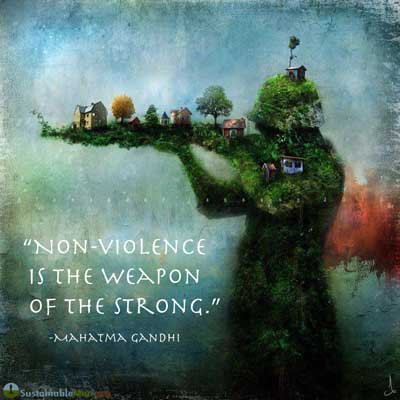
Second in a series of ten posts on the strategies of MLK.
Nonviolent direct action seeks to create such a crisis and establish such creative tension that a community that has constantly refused to negotiate is forced to confront the issue. It seeks so to dramatize the issue that it can no longer be ignored…there is a type of of constructive nonviolent tension that is necessary for growth.…So the purpose of the direct action is to create a situation so crisis-packed that it will inevitable open the door to negotiations. [1]
The Civil Rights movements’ primary strategic approach was, of course, non-violent mass civil disobedience. The major advances of the civil rights movement can be linked to the marches — sometimes in defiance of court injunction — sit-ins, freedom rides, attempts to vote or register, and demonstrations that landed thousands of people in jail and some in their graves.
King placed civil disobedience within a framework consistent with the inside/outside strategy. The disruptive nature of direct action and the seemingly more orderly process of negotiations may be tactically different but part and parcel of the same strategy. The outside game is the precondition for the inside game. Without outside pressure negotiations are reduced to begging and pleading or rest on puny legal claims.
 If this is all we learned from King, it would be enough.
If this is all we learned from King, it would be enough.
It may seem simple, but despite tremendous efforts of a small number of people the level of direct action is not of sufficient scale or character to win major concession let alone transform the basic structures of power. The new civil rights movement is a sure sign that things are changing. But, until we bring more people power to the table we will be left with reason, morality and truth, all necessary but far, far from sufficient to make history. The primary role of reason, morality, and truth is not to convince power but to help build a movement massive, daring and visionary enough to force change from the system.
The civil rights movement strongly suggests that such a movement will not be based on anger, outrage or criticism alone — although those are just and right. But it can be based upon Love. Blush. Nonviolence is how the civil right movement helps us to connect disruptive and militant political action with universal values of love.
Love as Politics
“Our white brothers must be made to understand that nonviolence is a weapon fabricated of love. It is a sword that heals. Our nonviolent direct action program has as its object not the creation of tensions, but the surfacing of tensions already present.” [2]
Love is a potent weapon. King states repeatedly that love does not mean the feeling we associate with friendship or romance and it certainly does not mean liking your enemy. The love that motivated the movement was grand redemptive love. Love was “agape” from the Greek. “Agape is understanding, redemptive, creative, good will to all men based on the mutual interests that derive from the interrelatedness of all people.” [3]
Love, by Kings definition, approaches the best understandings of “solidarity”— enlightened self-interest based on mutuality and interconnectedness. In King’s view, truly: “An injury to one is an injury to all.”
Gandhi’s innovation infused politics with love through the concept of satyagraha. Satyagraha is love-force or truth-force which the American movement revised into soul-force. While this big love is as difficult to grasp in its ultimate form as are other ideals, such as freedom or equality, we can glimpse love embodied in the civil rights movement.
Christ’s directive to “love your enemy” gathered new meaning as soul-force. The civil rights movement gave love to its enemies in the form of non-violent force: sit-ins, occupations, marches, strikes, picket-lines, boycotts. It is love because it is non-violence in the service of freedom and democracy; it is love because it targets the institutional structure of oppression, not the person; it is love because it recognizes we are all —all— trapped and diminished by the system; it is love because it dreams redemption as inclusive community. Love is a dangerous and demanding taskmaster.
I realize that this approach will mean suffering and sacrifice. It may mean going to jail…. it may even mean physical death. But if physical death is the price that a man must pay to free his children and his white brethren from a permanent death of the spirit, than nothing could be more redemptive. This is the type of soul-force that I am convinced will triumph over the physical force of the oppressor. [4]
Speaking truth to power — without truth-force — has been a pitiful failure. Instead speak truth to power in the language of direct mass action and dedication to the difficult work of organizing. But, how can we endure the years of struggle it takes to give force to truth? King’s example: find something great and grand to give us purpose and confidence.
All Martin Luther King quotes and citation are from, A Testament of Hope: The Essential Writings of Martin Luther King. ed James M. Washington
[1] Letter from a Birmingham Jail. 291-2.
[2] Playboy Interview: Martin Luther King, 349-350. See also p. 526.
[3] Love, Law and Civil Disobedience,46-47. See also 16-20, 256, 335
[4] Rising Tide of Racial Consciousness, 149
Leave a Reply